Fleurs du Mal Magazine


Or see the index
In this follow-up to her acclaimed debut The Met Office Advises Caution, Rebecca Watts observes and tests the limits of humanity’s engagement with the non-human.
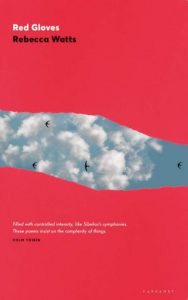 By turns lyrical and narrative, the poems examine familiar subjects – environmental crisis, hawks, hospitals, the sea, barbecues, flowers, Emily Dickinson – only to find their subjects staring, sometimes fighting, back.
By turns lyrical and narrative, the poems examine familiar subjects – environmental crisis, hawks, hospitals, the sea, barbecues, flowers, Emily Dickinson – only to find their subjects staring, sometimes fighting, back.
Nature and nurture, equally red in tooth and claw, power a book-long sparring match between the overthinking poet and the ever-thoughtless universe, between the craft’s isolation and the world’s irrepressible variety.
Gloves on and gloves off, the poet’s hands destroy and build, gather and scatter, caress and strike.
Red Gloves
The women are carrying the coffin. Under the fear
of slippage they make slow steps.
We cannot say that they advance.
More than one woman is weathering – from the cool
top of her head to her strained fingers to her toes
pushed together in interview shoes – the urge,
like a rip tide, to run backwards and away.
Today is not a normal day.
( . . . )
Rebecca Watts was born in Suffolk in 1983 and currently lives in Cambridge. Her debut poetry collection, The Met Office Advises Caution, was published by Carcanet in 2016. She is also the editor of Elizabeth Jennings: New Selected Poems (Carcanet, 2019).
Publisher: Carcanet Press Ltd.
Language: English
Paperback
72 pages
ISBN-10 : 178410955X
ISBN-13 : 978-1784109554
2020
£9.89
• fleursdumal.nl magazine
More in: #Editors Choice Archiv, - Book News, Archive W-X, Archive W-X
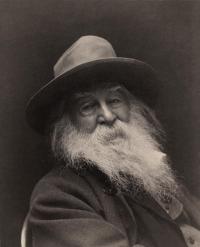
On the Beach at Night
On the beach at night,
Stands a child with her father,
Watching the east, the autumn sky.
Up through the darkness,
While ravening clouds, the burial clouds, in black masses spreading,
Lower sullen and fast athwart and down the sky,
Amid a transparent clear belt of ether yet left in the east,
Ascends large and calm the lord-star Jupiter,
And nigh at hand, only a very little above,
Swim the delicate sisters the Pleiades.
From the beach the child holding the hand of her father,
Those burial-clouds that lower victorious soon to devour all,
Watching, silently weeps.
Weep not, child,
Weep not, my darling,
With these kisses let me remove your tears,
The ravening clouds shall not long be victorious,
They shall not long possess the sky, they devour the stars only in apparition,
Jupiter shall emerge, be patient, watch again another night, the Pleiades shall emerge,
They are immortal, all those stars both silvery and golden shall shine out again,
The great stars and the little ones shall shine out again, they endure,
The vast immortal suns and the long-enduring pensive moons shall again shine.
Then dearest child mournest thou only for Jupiter?
Considerest thou alone the burial of the stars?
Something there is,
(With my lips soothing thee, adding I whisper,
I give thee the first suggestion, the problem and indirection,)
Something there is more immortal even than the stars,
(Many the burials, many the days and nights, passing away,)
Something that shall endure longer even than lustrous Jupiter
Longer than sun or any revolving satellite,
Or the radiant sisters the Pleiades.
Walt Whitman
(1819–1892)
On the Beach at Night
• fleursdumal.nl magazine
More in: Archive W-X, Archive W-X, Whitman, Walt
 If two girls are two halves of a deep, lifelong friendship, what does one girl wholly become when the other is gone?
If two girls are two halves of a deep, lifelong friendship, what does one girl wholly become when the other is gone?
Amy Woolard‘s debut collection, Neck Of The Woods, sets this question as a hero-quest deep inside the mythos of the American South, wandering through childhood stories in which a girl alone must work to save herself.
These poems take on what happens when you wake up the morning after something happens, and find yourself in a different world, knowing there isn’t truly a way back home.
Part-elegy, part-survivor’s testimony, Neck Of The Woods maps a path divided into a before and an ever after.
Amy Woolard is a legal aid attorney working on civil rights policy and legislation in Virginia. Her first collection, Neck of the Woods, received the 2018 Alice James Award from Alice James Books. Her poems have appeared in The New Yorker, The Paris Review, Poetry, Boston Review, Ploughshares, and elsewhere, while her essays and reporting have been featured in publications such as Slate, The Guardian, and Virginia Quarterly Review. She has received fellowships from the National Endowment for the Arts, the Vermont Studio Center, and the Breadloaf Writers’ Conference. She lives in Charlottesville, Virginia.
Neck of the Woods (Poetry)
Amy Woolard (Author)
Publisher: Alice James Books
Publish Date: April 07, 2020
Pages 100
Dimensions: 5.9 X 0.4 X 8.9 inches
Language: English
Type: Paperback
ISBN: 9781948579070
Price: $16.95
# new poetry
Amy Woolard:
Neck of the Woods
• fleursdumal.nl magazine
More in: #Editors Choice Archiv, - Book News, - Bookstores, Archive W-X, Art & Literature News
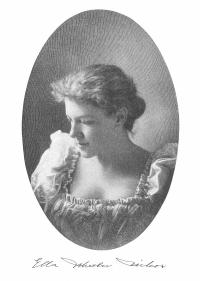
A Dream
In the night I dreamed that you had died,
And I thought you lay in your winding sheet;
And I kneeled low by your coffin side,
With my cheek on your heart that had ceased to beat.
And I thought as I looked on your form so still,
A terrible woe, and an awful pain,
Fierce as vultures that slay and kill,
Tore at my bosom and maddened my brain.
And then it seemed that the chill of death
Over me there like a mantle fell,
And I knew by my fluttering, failing breath
That the end was near, and all was well.
I woke from my dream in the black midnight –
It was only a dream at worst or best –
But I lay and thought till the dawn of light,
Had the dream been true we had both been blest.
Better to kneel by your still dead form,
With my cheek on your breast, and die that way,
Than to live and battle with night and storm,
And drift away from you day by day.
Better the anguish of death and loss,
The sharp, quick pain, and the darkness, then,
Than living on with this heavy cross
To bear about in the world of men.
Ella Wheeler Wilcox
(1855 – 1919)
A Dream (Poem)
• fleursdumal.nl magazine
More in: Archive W-X, Archive W-X, CLASSIC POETRY, Wheeler Wilcox, Ella

Song of the banner
at daybreak
Poet
O a new song, a free song,
Flapping, flapping, flapping, flapping, by sounds, by voices clearer,
By the wind’s voice and that of the drum,
By the banner’s voice and child’s voice and sea’s voice and father’s voice,
Low on the ground and high in the air,
On the ground where father and child stand,
In the upward air where their eyes turn,
Where the banner at daybreak is flapping.
Words! bookwords! what are you?
Words no more, for hearken and see,
My song is there in the open air, and I must sing,
With the banner and pennant a-flapping.
I’ll weave the chord and twine in,
Man’s desire and babe’s desire, I’ll twine them in, I’ll put in life,
I’ll put the bayonet’s flashing point, I’ll let bullets and slugs whizz,
(As one carrying a symbol and menace far into the future,
Crying with trumpet voice, _Arouse and beware! Beware and arouse!_)
I’ll pour the verse with streams of blood, full of volition, full of joy.
Then loosen, launch forth, to go and compete,
With the banner and pennant a-flapping.
Pennant
Come up here, bard, bard,
Come up here, soul, soul,
Come up here, dear little child,
To fly in the clouds and winds with me, and play with the measureless light.
Child
Father what is that in the sky beckoning to me with long finger?
And what does it say to me all the while?
Father
Nothing my babe you see in the sky,
And nothing at all to you it says–but look you my babe,
Look at these dazzling things in the houses, and see you the money-shops opening,
And see you the vehicles preparing to crawl along the streets with goods;
These, ah these, how valued and toil’d for these!
How envied by all the earth.
Poet
Fresh and rosy red the sun is mounting high,
On floats the sea in distant blue careering through its channels,
On floats the wind over the breast of the sea setting in toward land,
The great steady wind from west or west-by-south,
Floating so buoyant with milk-white foam on the waters.
But I am not the sea nor the red sun,
I am not the wind with girlish laughter,
Not the immense wind which strengthens, not the wind which lashes,
Not the spirit that ever lashes its own body to terror and death,
But I am that which unseen comes and sings, sings, sings,
Which babbles in brooks and scoots in showers on the land,
Which the birds know in the woods mornings and evenings,
And the shore-sands know and the hissing wave, and that banner and pennant,
Aloft there flapping and flapping.
Child
O father it is alive–it is full of people–it has children,
O now it seems to me it is talking to its children,
I hear it–it talks to me–O it is wonderful!
O it stretches–it spreads and runs so fast–O my father,
It is so broad it covers the whole sky.
Father
Cease, cease, my foolish babe,
What you are saying is sorrowful to me, much it displeases me;
Behold with the rest again I say, behold not banners and pennants aloft,
But the well-prepared pavements behold, and mark the solid-wall’d houses.
Banner and Pennant
Speak to the child O bard out of Manhattan,
To our children all, or north or south of Manhattan,
Point this day, leaving all the rest, to us over all–and yet we know not why,
For what are we, mere strips of cloth profiting nothing,
Only flapping in the wind?
Poet
I hear and see not strips of cloth alone,
I hear the tramp of armies, I hear the challenging sentry,
I hear the jubilant shouts of millions of men, I hear Liberty!
I hear the drums beat and the trumpets blowing,
I myself move abroad swift-rising flying then,
I use the wings of the land-bird and use the wings of the sea-bird, and look down as from a height,
I do not deny the precious results of peace, I see populous cities with wealth incalculable,
I see numberless farms, I see the farmers working in their fields or barns,
I see mechanics working, I see buildings everywhere founded, going up, or finished,
I see trains of cars swiftly speeding along railroad tracks drawn by the locomotives,
I see the stores, depots, of Boston, Baltimore, Charleston, New Orleans,
I see far in the West the immense area of grain, I dwell awhile hovering,
I pass to the lumber forests of the North, and again to the Southern plantation, and again to California;
Sweeping the whole I see the countless profit, the busy gatherings, earn’d wages,
See the Identity formed out of thirty-eight spacious and haughty
States, (and many more to come,)
See forts on the shores of harbors, see ships sailing in and out;
Then over all, (aye! aye!) my little and lengthen’d pennant shaped like a sword,
Runs swiftly up indicating war and defiance–and now the halyards have rais’d it,
Side of my banner broad and blue, side of my starry banner,
Discarding peace over all the sea and land.
Banner and Pennant
Yet louder, higher, stronger, bard! yet farther, wider cleave!
No longer let our children deem us riches and peace alone,
We may be terror and carnage, and are so now,
Not now are we any one of these spacious and haughty States, (nor any five, nor ten,)
Nor market nor depot we, nor money-bank in the city,
But these and all, and the brown and spreading land, and the mines below, are ours,
And the shores of the sea are ours, and the rivers great and small,
And the fields they moisten, and the crops and the fruits are ours,
Bays and channels and ships sailing in and out are ours–while we over all,
Over the area spread below, the three or four millions of square miles, the capitals,
The forty millions of people,–O bard! in life and death supreme,
We, even we, henceforth flaunt out masterful, high up above,
Not for the present alone, for a thousand years chanting through you,
This song to the soul of one poor little child.
Child
O my father I like not the houses,
They will never to me be any thing, nor do I like money,
But to mount up there I would like, O father dear, that banner I like,
That pennant I would be and must be.
Father
Child of mine you fill me with anguish,
To be that pennant would be too fearful,
Little you know what it is this day, and after this day, forever,
It is to gain nothing, but risk and defy every thing,
Forward to stand in front of wars–and O, such wars!–what have you to do with them?
With passions of demons, slaughter, premature death?
Banner
Demons and death then I sing,
Put in all, aye all will I, sword-shaped pennant for war,
And a pleasure new and ecstatic, and the prattled yearning of children,
Blent with the sounds of the peaceful land and the liquid wash of the sea,
And the black ships fighting on the sea envelop’d in smoke,
And the icy cool of the far, far north, with rustling cedars and pines,
And the whirr of drums and the sound of soldiers marching, and the hot sun shining south,
And the beach-waves combing over the beach on my Eastern shore, and my Western shore the same,
And all between those shores, and my ever running Mississippi with bends and chutes,
And my Illinois fields, and my Kansas fields, and my fields of Missouri,
The Continent, devoting the whole identity without reserving an atom,
Pour in! whelm that which asks, which sings, with all and the yield of all,
Fusing and holding, claiming, devouring the whole,
No more with tender lip, nor musical labial sound,
But out of the night emerging for good, our voice persuasive no more,
Croaking like crows here in the wind.
Poet
My limbs, my veins dilate, my theme is clear at last,
Banner so broad advancing out of the night, I sing you haughty and resolute,
I burst through where I waited long, too long, deafen’d and blinded,
My hearing and tongue are come to me, (a little child taught me,)
I hear from above O pennant of war your ironical call and demand,
Insensate! insensate! (yet I at any rate chant you,) O banner!
Not houses of peace indeed are you, nor any nor all their prosperity,
(if need be, you shall again have every one of those houses to destroy them,
You thought not to destroy those valuable houses, standing fast, full of comfort, built with money,
May they stand fast, then? not an hour except you above them and all stand fast;)
O banner, not money so precious are you, not farm produce you, nor the material good nutriment,
Nor excellent stores, nor landed on wharves from the ships,
Not the superb ships with sail-power or steam-power, fetching and carrying cargoes,
Nor machinery, vehicles, trade, nor revenues–but you as henceforth I see you,
Running up out of the night, bringing your cluster of stars, (ever-enlarging stars,)
Divider of daybreak you, cutting the air, touch’d by the sun, measuring the sky,
(Passionately seen and yearn’d for by one poor little child,
While others remain busy or smartly talking, forever teaching thrift, thrift;)
O you up there! O pennant! where you undulate like a snake hissing so curious,
Out of reach, an idea only, yet furiously fought for, risking bloody death, loved by me,
So loved–O you banner leading the day with stars brought from the night!
Valueless, object of eyes, over all and demanding all–(absolute owner of all)–O banner and pennant!
I too leave the rest–great as it is, it is nothing–houses, machines are nothing–I see them not,
I see but you, O warlike pennant! O banner so broad, with stripes, I sing you only,
Flapping up there in the wind.
Walt Whitman
(1819 – 1892)
Song of the banner at daybreak
From: Leaves of grass
• fleursdumal.nl magazine
More in: Archive W-X, Archive W-X, Whitman, Walt
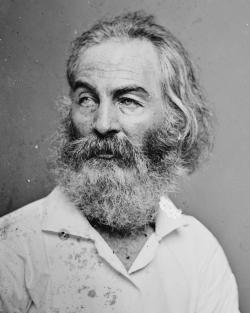
The wound-dresser
1
An old man bending I come among new faces,
Years looking backward resuming in answer to children,
Come tell us old man, as from young men and maidens that love me,
(Arous’d and angry, I’d thought to beat the alarum, and urge relentless war,
But soon my fingers fail’d me, my face droop’d and I resign’d myself,
To sit by the wounded and soothe them, or silently watch the dead;)
Years hence of these scenes, of these furious passions, these chances,
Of unsurpass’d heroes, (was one side so brave? the other was equally brave;)
Now be witness again, paint the mightiest armies of earth,
Of those armies so rapid so wondrous what saw you to tell us?
What stays with you latest and deepest? of curious panics,
Of hard-fought engagements or sieges tremendous what deepest remains?
2
O maidens and young men I love and that love me,
What you ask of my days those the strangest and sudden your talking recalls,
Soldier alert I arrive after a long march cover’d with sweat and dust,
In the nick of time I come, plunge in the fight, loudly shout in the rush of successful charge,
Enter the captur’d works–yet lo, like a swift-running river they fade,
Pass and are gone they fade–I dwell not on soldiers’ perils or soldiers’ joys,
(Both I remember well-many the hardships, few the joys, yet I was content.)
But in silence, in dreams’ projections,
While the world of gain and appearance and mirth goes on,
So soon what is over forgotten, and waves wash the imprints off the sand,
With hinged knees returning I enter the doors, (while for you up there,
Whoever you are, follow without noise and be of strong heart.)
Bearing the bandages, water and sponge,
Straight and swift to my wounded I go,
Where they lie on the ground after the battle brought in,
Where their priceless blood reddens the grass the ground,
Or to the rows of the hospital tent, or under the roof’d hospital,
To the long rows of cots up and down each side I return,
To each and all one after another I drawn near, not one do I miss,
An attendant follows holding a tray, he carries a refuse pail,
Soon to be fill’d with clotted rags and blood, emptied, and fill’d again.
I onward go, I stop,
With hinged knees and steady hand to dress wounds,
I am firm with each, the pangs are sharp yet unavoidable,
One turns to me his appealing eyes-poor boy! I never knew you,
Yet I think I could not refuse this moment to die for you, if that would save you.
3
On, on I go, (open doors of time! open hospital doors!)
The crush’d head I dress, (poor crazed hand tear not the bandage away,)
The neck of the cavalry-man with the bullet through and through I examine,
Hard the breathing rattles, quite glazed already the eye, yet life struggles hard,
(Come sweet death! be persuaded O beautiful death!
In mercy come quickly.)
From the stump of the arm, the amputated hand,
I undo the clotted lint, remove the slough, wash off the matter and blood,
Back on his pillow the soldier bends with curv’d neck and side-falling head,
His eyes are closed, his face is pale, he dares not look on the bloody stump,
And has not yet look’d on it.
I dress a wound in the side, deep, deep,
But a day or two more, for see the frame all wasted and sinking,
And the yellow-blue countenance see.
I dress the perforated shoulder, the foot with the bullet-wound,
Cleanse the one with a gnawing and putrid gangrene, so sickening, so offensive,
While the attendant stands behind aside me holding the tray and pail.
I am faithful, I do not give out,
The fractur’d thigh, the knee, the wound in the abdomen,
These and more I dress with impassive hand, (yet deep in my breast a fire, a burning flame.)
4
Thus in silence in dreams’ projections,
Returning, resuming, I thread my way through the hospitals,
The hurt and wounded I pacify with soothing hand,
I sit by the restless all the dark night, some are so young,
Some suffer so much, I recall the experience sweet and sad,
(Many a soldier’s loving arms about this neck have cross’d and rested,
Many a soldier’s kiss dwells on these bearded lips.)
Walt Whitman
(1819 – 1892)
The wound-dresser
From: Leaves of grass
• fleursdumal.nl magazine
More in: Archive W-X, Archive W-X, Whitman, Walt
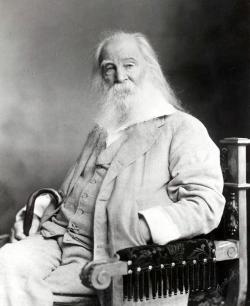
Give me the splendid silent sun
1
Give me the splendid silent sun with all his beams full-dazzling,
Give me juicy autumnal fruit ripe and red from the orchard,
Give me a field where the unmow’d grass grows,
Give me an arbor, give me the trellis’d grape,
Give me fresh corn and wheat, give me serene-moving animals teaching content,
Give me nights perfectly quiet as on high plateaus west of the Mississippi, and I looking up at the stars,
Give me odorous at sunrise a garden of beautiful flowers where I can walk undisturb’d,
Give me for marriage a sweet-breath’d woman of whom I should never tire,
Give me a perfect child, give me away aside from the noise of the world a rural domestic life,
Give me to warble spontaneous songs recluse by myself, for my own ears only,
Give me solitude, give me Nature, give me again O Nature your primal sanities!
These demanding to have them, (tired with ceaseless excitement, and rack’d by the war-strife,)
These to procure incessantly asking, rising in cries from my heart,
While yet incessantly asking still I adhere to my city,
Day upon day and year upon year O city, walking your streets,
Where you hold me enchain’d a certain time refusing to give me up,
Yet giving to make me glutted, enrich’d of soul, you give me forever faces;
(O I see what I sought to escape, confronting, reversing my cries,
I see my own soul trampling down what it ask’d for.)
2
Keep your splendid silent sun,
Keep your woods O Nature, and the quiet places by the woods,
Keep your fields of clover and timothy, and your corn-fields and orchards,
Keep the blossoming buckwheat fields where the Ninth-month bees hum;
Give me faces and streets–give me these phantoms incessant and endless along the trottoirs!
Give me interminable eyes–give me women–give me comrades and lovers by the thousand!
Let me see new ones every day–let me hold new ones by the hand every day!
Give me such shows–give me the streets of Manhattan!
Give me Broadway, with the soldiers marching–give me the sound of the trumpets and drums!
(The soldiers in companies or regiments–some starting away, flush’d and reckless,
Some, their time up, returning with thinn’d ranks, young, yet very old, worn, marching, noticing nothing;)
Give me the shores and wharves heavy-fringed with black ships!
O such for me! O an intense life, full to repletion and varied!
The life of the theatre, bar-room, huge hotel, for me!
The saloon of the steamer! the crowded excursion for me! the torchlight procession!
The dense brigade bound for the war, with high piled military wagons following;
People, endless, streaming, with strong voices, passions, pageants,
Manhattan streets with their powerful throbs, with beating drums as now,
The endless and noisy chorus, the rustle and clank of muskets, (even the sight of the wounded,)
Manhattan crowds, with their turbulent musical chorus!
Manhattan faces and eyes forever for me.
Walt Whitman
(1819 – 1892)
Give me the splendid silent sun
From: Leaves of grass
• fleursdumal.nl magazine
More in: Archive W-X, Archive W-X, Whitman, Walt

City of ships
City of ships!
(O the black ships! O the fierce ships!
O the beautiful sharp-bow’d steam-ships and sail-ships!)
City of the world! (for all races are here,
All the lands of the earth make contributions here;)
City of the sea! city of hurried and glittering tides!
City whose gleeful tides continually rush or recede, whirling in and
out with eddies and foam!
City of wharves and stores–city of tall façades of marble and iron!
Proud and passionate city–mettlesome, mad, extravagant city!
Spring up, O city–not for peace alone, but be indeed yourself,
warlike!
Fear not–submit to no models but your own O city!
Behold me–incarnate me as I have incarnated you!
I have rejected nothing you offer’d me–whom you adopted I have
adopted,
Good or bad I never question you–I love all–I do not condemn any
thing,
I chant and celebrate all that is yours–yet peace no more,
In peace I chanted peace, but now the drum of war is mine,
War, red war is my song through your streets, O city!
Walt Whitman
(1819 – 1892)
City of ships
From: Leaves of grass
• fleursdumal.nl magazine
More in: Archive W-X, Archive W-X, Whitman, Walt
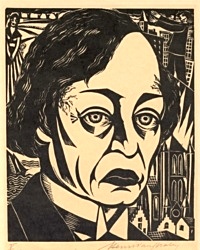
Ween aan mijn borst
Ween aan mijn borst den schat der tranen
die rijk me maken van uw leed,
ik die van wankelende wanen
als gij het talmend smeken weet;
ik die, mijn kind, op andre schouder
om eendre vreze heb geschreid,
maar van elke onmacht oud en ouder,
weer om een nieuwe hope lijd;
ik die het goud van alle transen
voor de as van oude zonnen ken,
maar van elk glorend morgen-glanzen
de huiverende minnaar ben…
Ween uwe tranen, lange en lijze,
die van uw lijden rijk me maakt:
straks ziet ge in ‘t oog des levens-wijzen
hoe stééds de wanen-lampe waakt…
Het huis in de stad (1908-1909)
Karel van de Woestijne
(1878 – 1929)
Ween aan mijn borst
Portret van Karel van de Woestijne (1937) door Henri van Straten (1892 – 1944)
• fleursdumal.nl magazine
More in: Archive W-X, Archive W-X, Woestijne, Karel van de

Vigil strange I kept on the field one night
Vigil strange I kept on the field one night;
When you my son and my comrade dropt at my side that day,
One look I but gave which your dear eyes return’d with a look I shall never forget,
One touch of your hand to mine O boy, reach’d up as you lay on the ground,
Then onward I sped in the battle, the even-contested battle,
Till late in the night reliev’d to the place at last again I made my way,
Found you in death so cold dear comrade, found your body son of responding kisses, (never again on earth responding,)
Bared your face in the starlight, curious the scene, cool blew the moderate night-wind,
Long there and then in vigil I stood, dimly around me the battle-field spreading,
Vigil wondrous and vigil sweet there in the fragrant silent night,
But not a tear fell, not even a long-drawn sigh, long, long I gazed,
Then on the earth partially reclining sat by your side leaning my chin in my hands,
Passing sweet hours, immortal and mystic hours with you dearest comrade–not a tear, not a word,
Vigil of silence, love and death, vigil for you my son and my soldier,
As onward silently stars aloft, eastward new ones upward stole,
Vigil final for you brave boy, (I could not save you, swift was your death,
I faithfully loved you and cared for you living, I think we shall surely meet again,)
Till at latest lingering of the night, indeed just as the dawn appear’d,
My comrade I wrapt in his blanket, envelop’d well his form,
Folded the blanket well, tucking it carefully over head and carefully under feet,
And there and then and bathed by the rising sun, my son in his grave, in his rude-dug grave I deposited,
Ending my vigil strange with that, vigil of night and battle-field dim,
Vigil for boy of responding kisses, (never again on earth responding,)
Vigil for comrade swiftly slain, vigil I never forget, how as day brighten’d,
I rose from the chill ground and folded my soldier well in his blanket,
And buried him where he fell.
Walt Whitman
(1819 – 1892)
Vigil strange I kept on the field one night
From: Leaves of grass
• fleursdumal.nl magazine
More in: Archive W-X, Archive W-X, Whitman, Walt
Begin jaren tachtig ontmoette Lawrence Weschler de toen nog hard aan de weg timmerende Oliver Sacks in New York.
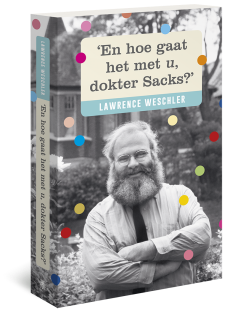 Het was een onzekere periode voor de jonge neuroloog: Sacks’ eerste boek Ontwaken in verbijstering was tien jaar eerder al verschenen, maar hij had het grote publiek nog niet bereikt.
Het was een onzekere periode voor de jonge neuroloog: Sacks’ eerste boek Ontwaken in verbijstering was tien jaar eerder al verschenen, maar hij had het grote publiek nog niet bereikt.
Met de jaren groeide Sacks’ bekendheid en werd de vriendschap tussen hem en Weschler hechter. Op zijn sterfbed vroeg Sacks zijn goede vriend of hij zijn verhaal zou willen optekenen. Dit boek is het resultaat van dat verzoek.
In En hoe gaat het met u, dokter Sacks? brengt Weschler Sacks’ extravagante persoonlijkheid prachtig tot leven. We worden teruggevoerd naar Sacks’ jongere jaren vol drugs en turbulentie, volgen hem in zijn werk als neuroloog en schrijver, zien hem patiënten helpen en vrienden vermoeien, en we volgen zijn strijd met medische en wetenschappelijke instellingen om aandacht te krijgen voor zijn belangrijkste bekommernis als neuroloog: de individuele menselijke ziel.
Weschler is erin geslaagd om Sacks’ belangrijkste vraag voor zijn patiënten – Hoe gaat het met u? – terug te kaatsen naar de beroemde neuroloog zelf.
Lawrence Weschler (1952) schreef meer dan twintig jaar voor The New Yorker. Daarnaast gaf hij les aan prominente Amerikaanse universiteiten waaronder Princeton, Columbia, Brown en New York University. Aan de laatstgenoemde universiteit was hij tot 2013 directeur van het New York Institute for the Humanities. Weschlers oeuvre bestaat uit veelgeprezen literaire non-fictie over allerlei politieke en culturele onderwerpen.
En hoe gaat het met u, dokter Sacks?
Lawrence Weschler
Oorspronkelijke titel: And How AreYou, Dr. Sacks?
Paperback
De Bezige Bij 2019
Aantal pagina’s 496
Paperback: 34,99
# new books
And How AreYou, Dr. Sacks?
Lawrence Weschler
• fleursdumal.nl magazine
More in: #Biography Archives, - Book News, - Book Stories, Archive S-T, Archive W-X, In Memoriam, Oliver Sacks, Psychiatric hospitals
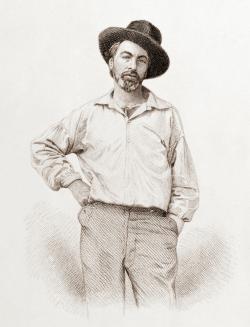
As I lay with my head in your lap camerado
As I lay with my head in your lap camerado,
The confession I made I resume, what I said to you and the open air I
resume,
I know I am restless and make others so,
I know my words are weapons full of danger, full of death,
For I confront peace, security, and all the settled laws, to unsettle
them,
I am more resolute because all have denied me than I could ever have
been had all accepted me,
I heed not and have never heeded either experience, cautions,
majorities, nor ridicule,
And the threat of what is call’d hell is little or nothing to me;
And the lure of what is call’d heaven is little or nothing to me;
Dear camerado! I confess I have urged you onward with me, and still
urge you, without the least idea what is our destination,
Or whether we shall be victorious, or utterly quell’d and defeated.
Walt Whitman
(1819 – 1892)
As I lay with my head in your lap camerado
From: Leaves of grass
• fleursdumal.nl magazine
More in: Archive W-X, Archive W-X, Whitman, Walt
Thank you for reading Fleurs du Mal - magazine for art & literature